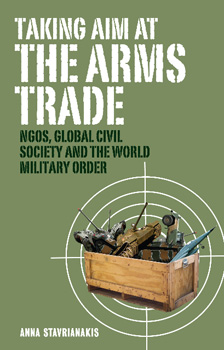NGOs, Global Civil Society and the World Military Order
Anna Stavrianakis
Civil society activism on security issues such as weapons control has a distinguished history, from the anti-nuclear movement of the Cold War to the campaigns against landmines, cluster munitions and small arms of the post-Cold War era. Since the 1990s, NGOs have been important players in conventional arms control, advocating for and achieving policy change at the national and international level. However, there are a number of reasons to be sceptical of a purely positive judgment.

Military production and trade amongst the world’s largest military spenders are not significant issues of concern for most NGOs. They mainly focus on arms exports to and the circulation of weapons within the South, especially small arms.
What's more, an under-appreciated effect of NGO activism is the way in which it obscures the North-South relations of the arms trade, disconnects organised violence in the South from the world military order of which it is a part, and creates the South as a site of intervention.
Conducted between 2003 and 2010, the research examined the objectives, strategies and effects of the seven main UK-based NGOs working on conventional arms trade issues: Amnesty International, British American Security Information Council, Campaign Against Arms Trade, the International Action Network on Small Arms, International Alert, Oxfam, and Saferworld. It involved documentary analysis of government and NGO accounts of the arms trade, semi-structured interviews in London and Oxford with over 50 NGO workers, civil servants, MPs and other key actors, and a small amount of participant observation with NGOs.
This research was supported by an ESRC PhD studentship and Postdoctoral Fellowship.
Publications
Stavrianakis, A. (2010) Taking Aim at the Arms Trade. NGOs, Global Civil Society and the World Military Order, London: Zed Books.
Stavrianakis, A. (2008) 'Licensed to Kill: The United Kingdom’s arms export licensing process', The Economics of Peace and Security Journal 3(1), pp. 32-39.
Stavrianakis, A. (2005) '(Big) Business As Usual: Sustainable Development, NGOs, and UK Arms Export Policy' Conflict, Security and Development, 5(1), pp. 45-67.


